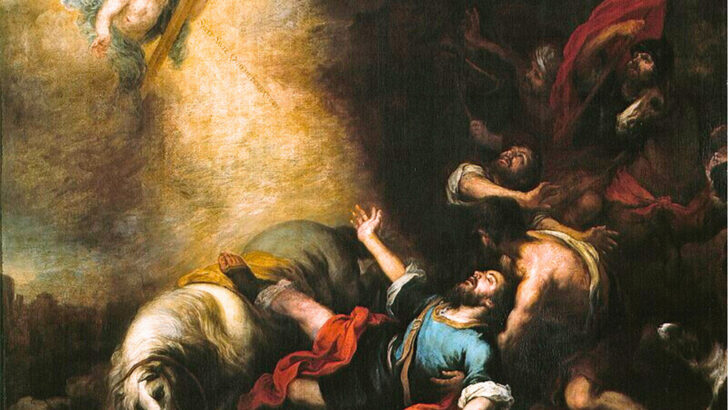From the late Pope Emeritus Benedict XVI General Audience at the Paul VI Audience Hall on September 3, 2008.
Dear Brothers and Sisters,
Today’s Catechesis is dedicated to the experience that Paul had on his way to Damascus, and therefore on what is commonly known as his conversion. It was precisely on the road to Damascus, at the beginning of the 30s in the first century and after a period in which he had persecuted the Church that the decisive moment in Paul’s life occurred. Much has been written about it and naturally from different points of view. It is certain that he reached a turning point there, indeed a reversal of perspective. And so he began, unexpectedly, to consider as “loss” and “refuse” all that had earlier constituted his greatest ideal… What had happened?
In this regard we have two types of sources. The first kind, the best known, consists of the accounts we owe to the pen of Luke, who tells of the event at least three times in the Acts of the Apostles. The average reader may be tempted to linger too long on certain details, such as the light in the sky, falling to the ground, the voice that called him, his new condition of blindness […] But all these details refer to the heart of the event: the Risen Christ appears as a brilliant light and speaks to Saul, transforms his thinking and his entire life… What was his inner reality is also outwardly apparent, his blindness to the truth, to the light that is Christ. And then his definitive “yes” to Christ in Baptism restores his sight and makes him really see.
In the ancient Church Baptism was also called “illumination”, because this Sacrament gives light; it truly makes one see. In Paul what is pointed out theologically was also brought about physically: healed of his inner blindness, he sees clearly. […] It radically changed Paul’s life in a fundamental way; in this sense one can and must speak of a conversion. […]
The second type of source concerning the conversion consists in St Paul’s actual Letters. He never spoke of this event in detail, I think because he presumed that everyone knew the essentials of his story… Without speaking in detail, he speaks on various occasions of this most important event, that, in other words he too is a witness of the Resurrection of Jesus, the revelation of which he received directly from Jesus, together with his apostolic mission. […] In his “self-apology” he stresses that he is a true witness of the Risen One, that he has received his own mission directly from the Risen One.
In this sense it was not simply a conversion… but rather a death and a resurrection for Paul himself”
Thus we can see that the two sources, the Acts of the Apostles and the Letters of St Paul, converge and agree on the fundamental point: the Risen One spoke to Paul, called him to the apostolate and made him a true Apostle, a witness of the Resurrection, with the specific task of proclaiming the Gospel to the Gentiles, to the Greco-Roman world… Paul learned that despite the immediacy of his relationship with the Risen One, he had to enter into communion with the Church, he himself had to be baptised, he had to live in harmony with the other Apostles. Only in such communion with everyone could he have been a true apostle. […]
In all these passages Paul never once interprets this moment as an event of conversion. Why? There are many hypotheses, but for me the reason is very clear. This turning point in his life, this transformation of his whole being… came from the outside: it was not the fruit of his thought but of his encounter with Jesus Christ. In this sense it was not simply a conversion… but rather a death and a resurrection for Paul himself. […]
Turning now to ourselves… It means that for us too Christianity is not a new philosophy or a new morality. We are only Christians if we encounter Christ… He does not show himself to us in this overwhelming, luminous way, as he did to Paul to make him the Apostle to all peoples. But we too can encounter Christ in reading Sacred Scripture, in prayer, in the liturgical life of the Church. We can touch Christ’s Heart and feel him touching ours. Only in this personal relationship with Christ do we truly become Christians. And in this way our reason opens, all Christ’s wisdom opens as do all the riches of truth.
Let us pray the Lord to illumine us, to grant us an encounter with his presence in our world, and thus to grant us a lively faith, an open heart and great love for all, which can renew the world.


 Conversion of St Paul, Bartolomé Esteban Murillo
Conversion of St Paul, Bartolomé Esteban Murillo 